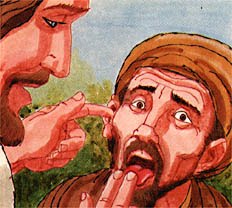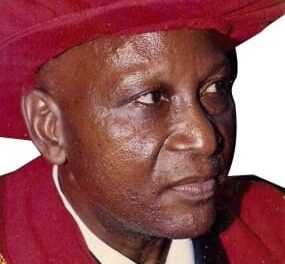Maya Angelou said, “If you don’t know where you’ve come from, you don’t know where you’re going.” Wesley’s ‘Old Normal’ for the ‘New Normal’: Forward to the Past encourages us to see our past in future. Beyond the ‘new normal’ adaptation to isolation and lockdown, and the physical and mental needs that are arising as a result of Covid-19, for us to know where we are going as followers of Jesus and most especially as Methodist Christians, God is calling us to look back again to see our past in future. The Prodigal’s return reminds us of the importance of ‘forward to the past’ (Lk 15:20). The church and the world are yet a great way off the plan, mission, and purpose of God and disease and racism have amplified it in the ‘new normal.’ Just as the prodigal boy had, in the far away country, a vision of his old home after coming to his missional senses, he sat and thought of his dishonour and his ruin, there flashed before him a picture which made him home-sick. Forward to the past, the prodigal son’s renewed vision brought back the old home, ‘old normal,’ in all its beauty and blessedness.
The ‘new normal’ shaped by the ruins of the pandemic and racism continue to alter our mission sense, worship, work, home, and social life and beyond a marketing opportunity, it is a forward mission opportunity to the past. Just as there was plenty in the ‘old normal,’ while the once happy, favoured son is perishing with hunger ‘new normal,’ God is inviting, especially the church just as the prodigal son was invited to return home, ‘old normal,’ and stop following the ways of the world. There are always mission memories that hang over the soul like trailing clouds in the sky. The early Methodist missional heritage, reminiscences of our long-lost, long forgotten past ‘old normal’ having a form of religion with power is a vision possible of restoration to the ‘new normal.’.
Steve Harper’s description of John Wesley as a “Theologian of the Gaps” at a time when the Church of England had largely abandoned direct ministry to the masses, preferring to concentrate on a rather elite church suggests the ‘old normal’ for the changing routines and ‘new normal’ upheavals brought by Covid-19. The Great Evangelical Revival of the 18th Century, the Methodist movement precisely, launched by John Wesley remains ‘old normal,’ a model of missional, extraordinary and peaceful transition for the ‘new normal.’
Before the Covid-19 pandemic, the lockdown and social-distancing there has been what I called the global war and racism pandemic and church decline. Just as the world is responding to overcome the Covid-19 pandemic through the ‘new normal’ approaches, the church is not bereft of ‘new normal’ ideas and actions. The age of Wesley, 1675 – 1830 was not free from its own crisis and pandemics, hence, the age of Wesley was a time of transition within English society, hence a model for our forward to the past.
The world, the family, and the church are in a time of transition today and one way to understand and appreciate Wesley’s contribution is to view him as a theologian and leader of ‘old normal.’ Let us consider and investigate on the synthesis and synergy Wesley created and applied in his approach to ‘old normal’ belief and practice in the 18th century. Wesley’s ‘old normal’ way of life is based first on his personal conversion and encounter with the Holy Spirit. Wesley’s ‘old normal’ is not shaped doer leadership before being leadership. For Wesley’s ‘old normal,’ faithfulness to God preceded fruitful leadership for God and to church. Using the words of Jorge Acevedo, ‘vocational holiness is personal,’ hence Wesley’s holiness of heart and life was experienced with Jesus before living it out with people. Wesley’s ‘old normal’ as a leader is not first about what do l need to do, but whom I need to be, that is, first ‘being leader before doer leader.’
Wesley’s ‘old normal’ belief and leadership practice reminds us that you cannot give what you don’t have as a leader, hence, leadership influences church growth or decline. Wesley’s ‘old normal’ first set out with a leadership doctrine based on his personal salvation even as a clergy within the Church of England. Indeed, one can go into the seminary as a saint and come out as a sinner and one can go in as a sinner and come out as a saint. For Wesley, a product of the ministerial training of his age, his conversion almost 13 years after his ordination points us to efficacy of Wesley’s ‘old normal,’ having a form of religion with power. The leadership power in this context is not about hierarchical achievement, self-esteem, or control of others. Wesley’s form of leadership with power beyond the maintenance expression of the church’s in-house liturgies is shaped by the urgency of the gospel for everyone. Wesley’s famous ‘old normal’testimony ‘I felt my heart strangely warmed, I felt l did trust in Christ, Christ alone for salvation…’ provides an insight and the need for personal conversion and renewal through the power of the Holy Spirit for effective leadership in the ‘new normal.’
Wesley’s ‘old normal’ conversion from shallow moralism and lip services of his days that substitute good works to faith in Christ suggests a forward to the past, a conversion of ‘new normal’ leadership conception of the way of personal salvation. Wesley’s ‘old normal’ for the ‘new normal’ – Forward in the past is not a straitjacket tradition but a guide to our history and spirituality. History tells us who we are, our family tree, and where we came from, what we have gone through and yet, we are still alive.
Wesley’s ‘old normal’ for the ‘new normal’ – Forward in the past is a call, first to leadership ‘Heart check,’ just as Clinics and hospitals hold ‘Coronary Risk Evaluations’ for men and women of any age. We continue to employ and apply different medication in form of ‘new normal,’ fresh strategies and expressions forgetting that the concern is first about the spiritual health of our hearts. Heart checks beyond bodily function is to rectify leakages and blockages to the free flow of the Holy Spirit. According to Ezekiel 36, we read about two hearts – a heart of “flesh” and a heart of “stone.” The good news is that God is able to give, ‘a new heart and a new spirit …’ (Ezk 36:26). Just as the old preacher Samuel warned Saul that God had rather have obedience and submission of the heart more than the fat of rams, God is saying to the leadership, the ‘new normal’ is not just a reset button but a redemptive button of the ‘old normal’ being of leadership.











Recent Comments